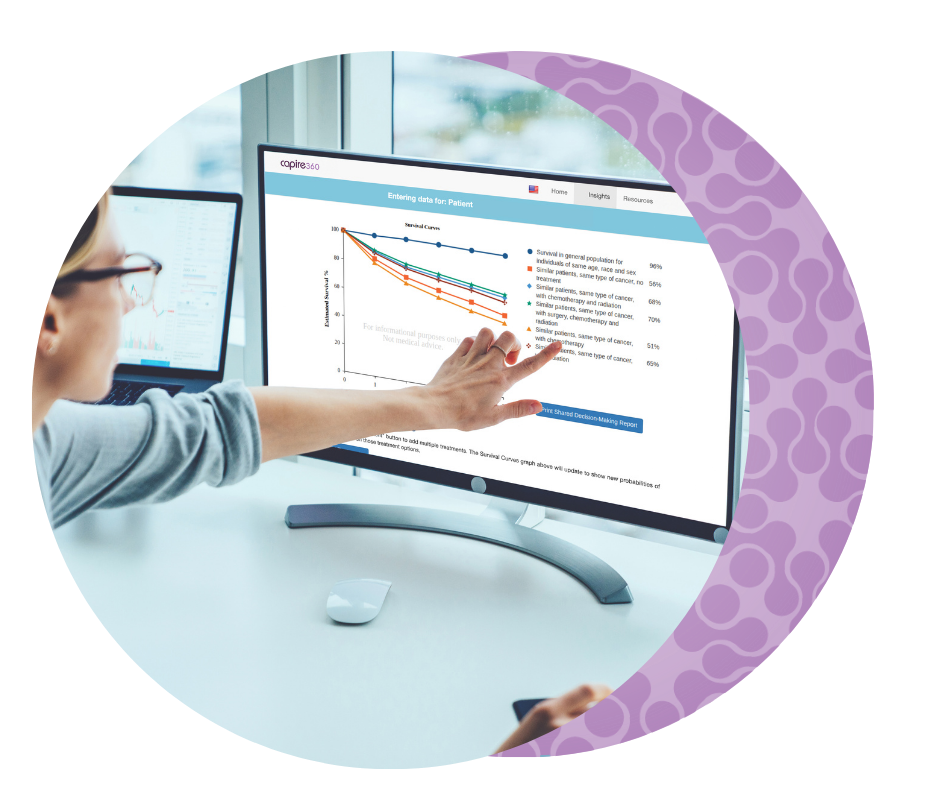Capire360
for cancer
Cancer is not only one of the most emotionally overwhelming diagnoses—it’s also the most expensive, with costs projected to soar even higher in the coming years. What’s worse, nearly half of cancer treatments don’t provide the expected benefits.
In the US alone, half of cancer treatments constitutes a $100 billion a year in healthcare spending. Is this placing unnecessary burden on those who pay for healthcare? We believe it is, and sadly, a reduced quality of life for many cancer patients.


Capire360’s cancer treatment decision support models were created to complement the knowledge and expertise of oncologists.
Oftentimes, they base cancer recommendations on national guidelines established through a limited number of clinical trials. While clinical trials are valuable, they often focus on narrow, predefined groups of patients under controlled conditions, limiting their applicability to broader patient populations.
Capire360 for Cancer is the first to reveal outcomes data for:
People Like You
Data pulled from other people the same age, sex, race/ethnicity, health status, with the same cancer
The Effect of Individual Treatment Modalities
Capire360 is the only tool on the market that can isolate outcomes for different treatment modalities (surgery, chemo, radiation, ect.), show combinations of treatment and survival rates for patients, including those who chose no treatment.
Comorbidities
Using a widely adapted comorbidity scoring tool, Capire360 for Cancer accounts for how a patient’s pre-existing health conditions and overall health will impact treatment outcomes. This is a critical and often overlooked variable for treatment consideration in many cancer types.
The beauty of Capire360 is it draws outcomes information from millions of cancer patients in everyday healthcare settings with various comorbidities, health challenges, and diverse backgrounds.
With Capire360, a personalized view of outcomes data is aggregated by “people like you”, i.e., similar age, sex, race, health status, and cancer diagnosis. This view allows oncologist and patients to see the outcomes of cancer treatment decisions made by people like them. For example, if the patient is an Asian woman in her 50s with stage II breast cancer and in good health, she can be shown the outcomes of various treatment options she and her oncologist could consider for an Asian women in their 50s with stage II breast cancer and in good health.
Access to this in-depth and personalized data allows for better-informed decisions as well as illuminates the importance of ensuring patients understand the tradeoffs of treatments.


Health status matters when it comes to cancer treatment decision support. Cancer patients often have comorbidities that affect treatment, care plans, and outcomes. Our models use a validated scoring system to assess and quantify the comorbidity burden in cancer patients.
Proprietary analytic models expertly validated and rigorously tested
PotentiaMetrics spent a decade developing and testing Capire360 within top medical schools. The statistical models that power Capire360 are tested internally and externally, ensuring they accurately reflect survival outcomes.
Experts in healthcare analytics from the Erasmus University Medical Center, one of the world’s top programs in medical decision-making and prognostic modeling, have validated the models and their methodology. Capire360 is also continuously reviewed by oncologists and compared to data from the national databases to ensure accuracy and confirm clinical value.
PotentiaMetrics has created fifteen cancer models covering eighty-five percent of cancer cases, and with a focus on cancer types where adjuvant therapies are considered.

Have questions?
Get in touch
901 S Mopac Expy
Bldg. 1, Ste. 300
Austin, TX 78746
Call
(512) 708 9000
info@potentiametrics.com
